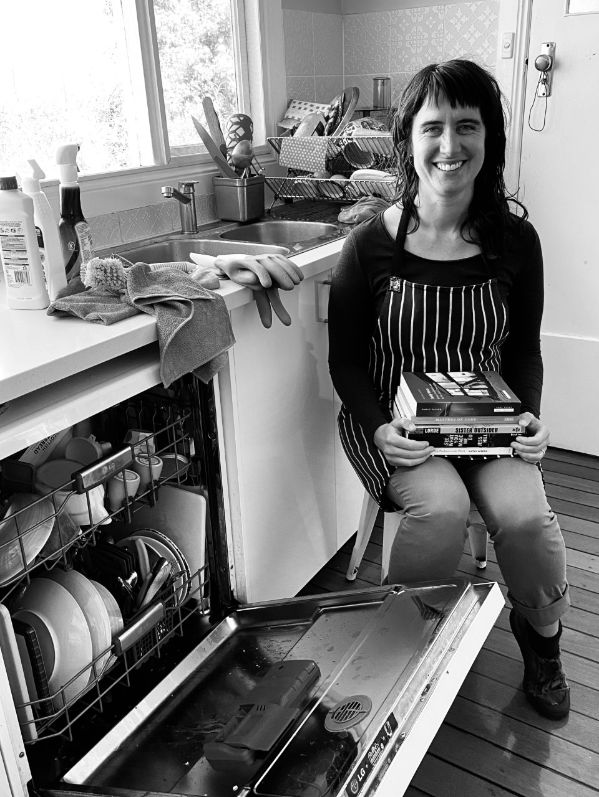One of the important questions many are grappling with in this new era of shared care and working from home is seemingly mundane: who does the dishes?
While the conventional answer is that they should be shared equally, the issue – and the actual list of housework that needs to be done – is much bigger than that.
"The question of who is going to do the dishes is arguably one of the most important and interesting questions of our time,” says Dr Hamilton, an environmental cultural studies researcher from UNE's School of Humanities, Arts and Social Sciences.
"In households around the world, traditional expectations surrounding housework are being re-evaluated. Job losses and working-from-home schedules are sparking fresh conversations and debates about what jobs really matter in a time of pandemic and climate change."
Keeping everyone safe in the midst of a deadly pandemic has highlighted how care work and housework supports the basic functioning of life and society. The closure of early childhood centres and schools simply added education to the house-worker's long and complex job description.
"These trends raise familiar questions about gender and inequity, especially around the kinds and divisions of labour that support the functioning of our families, communities, businesses and economies," Dr Hamilton says. “But they even call into question the structure of the family itself – or how we distribute care work between loved ones and in what ways."
Unprofitable – but indispensable
We all have to do dishes. It isn’t just a matter of equally splitting the housework between two parents; it’s about rethinking how we meet our basic needs."Private and unwaged work - housework and childcare - is unprofitable in a society driven by profit," Dr Hamilton says. "It is socially and economically marginalised, yet it's vital for everyone (whether you have a conventional or unconventional family life). While more equal gendered division of labour in the home is important to discuss in the wake of coronavirus lockdowns, we also need a broader conversation in society about how this vital work fits into our society, economy and environment."
The household has always been at the centre of economic life. The English word ‘economy’ and ‘ecology’ both derive from the Greek word oikos meaning ‘home’. But housekeeping activities have low social status and have traditionally been seen as banal and boring, incidental to both the economy and ecology. Historically, they have also been gendered feminine.
"Whereas waged work is characterised as desirable, and a marker of financial and personal success, housework remains both fiscally devalued and a marker of oppression or lack of ambition," Dr Hamilton says. “Frankly, I didn’t go to university to learn how to do the dishes, I went to university so I could get out of doing the dishes. Yet every individual life is underpinned by and often dependent on unwaged care labour and housework that maintains life day in and day out. This work provides the productive workforce that capitalism demands.
The reality is that if women are going to be truly successful in the contemporary workplace, then someone else has to do the dishes. Who is that and how do we value them? Or do we all need to work a little differently?"
‘Powerful and troubling’ insights
This debate, Dr Hamilton says, is not new. But the drought, bushfires and COVID is making clear what many care workers have been arguing for a long time: we need to reconsider the relationship between waged and unwaged work.
"It has taken a global pandemic to fully demonstrate that care work - in our homes, hospitals and schools - is vital to the functioning of society," says Dr Hamilton."Frontline health workers have kept people alive. Early childhood, primary and secondary educators have almost singlehandedly kept our national economy afloat.
"This is both powerful and troubling. Powerful because what we once had to work hard to illustrate statistically is now patently obvious. Troubling because the difficulty parents and carers have experienced juggling working from home and home-schooling their children has shown how precarious and near-impossible our so-called life-work 'balance' is.
"All of this demonstrates that the fundamental structure and culture of work itself needs to change. That satisfying the needs of parents and caregivers who want a meaningful job and to be present for their children and loved ones is really, really hard. We need to delve so much deeper into what we need as communities to ensure that truly valuable care work - whether paid or unpaid, by whichever gender - is adequately valued and supported.”
This is the moment
"In my view, it's now or never,” Dr Hamilton says. “No other moment in history has so painfully highlighted the limitations of the current job market to build a just society or how unpaid work is unevenly distributed and improperly valued. Maybe this crisis will even inspire a completely new or at least more diverse economy."
Dr Hamilton says there will always be housework - as in menial tasks - but perhaps we need to understand and value them differently. She ponders a future in which there is no distinction between unwaged and waged labour, and work (in all its forms) is regarded as a collective responsibility.
"Resolving the issue of who does the dishes begins with new negotiations in the domestic sphere," she says. "But once we see the wider philosophical and ecological aspects of this problem, we can build a more just and socially cohesive future post-COVID."


